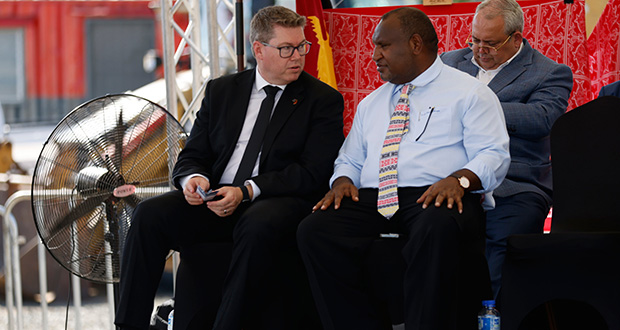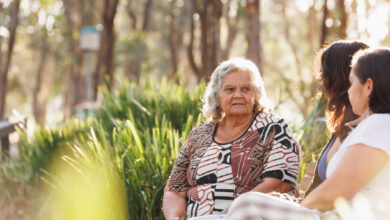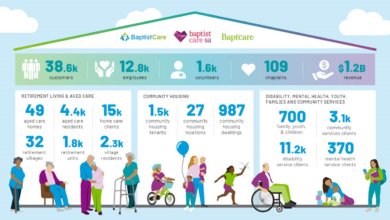First workers arrive from Papua New Guinea under revised government scheme

A regional Queensland aged care provider has welcomed the first group of personal care workers from overseas under a renewed government scheme.
Yesterday, the eight workers from Papua New Guinea (PNG) arrived under the Pacific Australia Labour Mobility (PALM) scheme to take up employment in three Southern Cross Care Queensland (SCCQ) homes.
The PALM scheme enables Australian businesses to hire workers from nine Pacific islands and Timor-Leste to fill labour gaps in unskilled, low-skilled, and semi-skilled positions, particularly in regional areas.
SCCQ chief Jason Eldering said he was grateful to receive skilled staff from PNG after the provider had been experiencing significant workforce shortages.
"The arrival of these workers will be enormously beneficial," Mr Eldering said.
"Considering the industry is facing challenges in recruitment and retention, particularly in our rural and remote communities, the program's expansion is warmly welcomed."
Rural aged care homes in Australia have struggled to attract and retain staff due to smaller population pools, housing shortages, geographic isolation, and a nationwide workforce shortage.
New legislation mandating 24/7 registered nurses and increased care minutes per resident have exacerbated pressures for many rural facilities.
Slow visa processing accompanied by high fees for overseas workers also compounded the problem, to which the government recently introduced a new streamlined visa process.
"These aged care workers will boost our staff numbers and help to fill the gap in our rural and remote aged care homes," Mr Eldenring said.
"In turn, we hope they will find their experience with us one of immense value too."
The federal government recently made major changes to the PALM scheme to ensure better protection and support for PALM workers.
Key initiatives included strengthening oversight, supporting worker qualifications, facilitating superannuation access, and introducing Medicare for participating families.
The Australian Workers' Union welcomed the noteworthy changes, such as a minimum requirement of 30 weekly working hours and a minimum take-home pay of $200.
AWU National Secretary Daniel Walton said the revisions promised pay parity with domestic workers and made inductions mandatory for all workers.
"Our international reputation has been tarnished for too long," Mr Walton said.
"We should never lose sight of the fact that the PALM scheme is not just about filling labour shortage gaps but also about strengthening ties with our neighbours.
"That can only happen if the people who come here to work are treated respectfully and fairly."
Over a thousand PALM scheme workers will receive assistance in obtaining formal qualifications within four years.
Support will also be increased to facilitate easier access to superannuation savings for PALM scheme workers upon their return to their home countries.
An initial group of 200 families participating in the government's family pilot will gain access to Medicare.
It also allows Pacific and Timor-Leste workers to take jobs in Australia, develop their skills, and send income home.
"I hope this paves the way for more PNG aged care workers to come to Australia," Minister for International Development and the Pacific Pat Conroy said.
"They'll be sending home remittances to their families, help Australian regional communities facing labour shortages and bring our people closer together."
There are currently over 600 PALM scheme workers employed in Australian aged care homes, with 500 more set to achieve qualifications.
The expansion of the PALM scheme will raise the total number of Pacific and Timor-Leste workers in Australia from 24,400 to over 38,000.
But it's the first time a group from PNG has taken up employment in Australia under the PALM scheme.
"They're making a great contribution to addressing workforce shortages, especially in regional areas," Minister for Aged Care Anika Wells said.
"Pacific and Timorese workers have earned a positive reputation in the aged care sector.
"Their strong passion for caring will only enhance the wellbeing of the older Australians."
The group come from PNG provinces such as Western Highlands, New Ireland, and Morobe.
They'll be joining a team of over a thousand SCCQ staff and work at Chinchilla, Murgon, and Taroom aged care facilities.
SCCQ delivers services to over 2,000 people across 13 aged care facilities, five retirement villages, and home care services across Queensland.
"They will draw from their strong culture and natural upbringing in caring for their older family members," Papua New Guinea High Commissioner John Kali said.
"Papua New Guineans and Australians have always cared for each other during good and bad times.
"The arrival of these PNG workers further strengthens the strong bonds between our two countries."
Email: [email protected]





